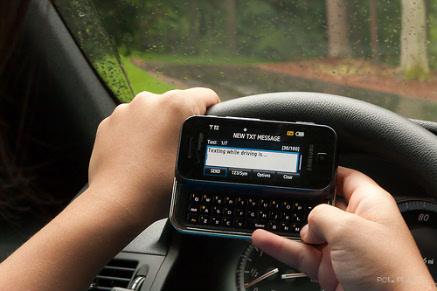NTSB calls for total ban on drivers using cell phones
The NTSB is calling for a nationwide boycott of using cell phones while driving. Though texting and driving laws are popular, this proposal would go much farther. (Photo by Flickr user poka0059, cc-by.)
The NTSB wants all drivers to hang up the phone.
Forget the hands-free device, and don’t try to say you’re only talking, the NTSB, that’s the U.S. National Transportation Safety Board, wants cell phones to be completely forbidden from drivers of vehicles. Too distracting, they say.
Deborah Hersman, chairwoman of the NTSB said people are tempted to Facebook and Tweet from behind the wheels, despite having hundreds, if not thousands, of pounds of plastic and steels under their control. More than 3,000 people lost their lives in distraction-related car crashes last year.
“It’s the equivalent of having a plane crash every week,” Hersman said.
She said her agency has investigated distraction among locomotive engineers, transit buses and even airplanes as well. So she’s ready to take action.
“It is a culture issue. It’s not just a consumer and a safety issue. It’s about changing attitudes,” she said.
To be sure, the NTSB does not have legislative power. So, just because the NTSB wants people to put their phones away, it’s not quite time to hang up — legally, at least.
“We make recommendations. We investigate accidents, we learn from them and we make recommendations. It’s up to other to act on them,” Hersman said.
But based on their investigations, Hersman said people don’t perform well when they’re multi-tasking, and that leads to accidents.
“No text, no call, no Facebook post is worth a human life,” Hersman said.
The bigger question here becomes how would technology be changed to enforce just such a ban. In the report, the NTSB recommended cell phone companies pursue technology that would allow drivers to voluntarily shut their phone off while driving, or at least when the vehicle is moving.
“I think this is very much like smoking, like drinking and driving, like seat belt use and it is going to take some time for people to be educated about this,” Hersman said. “But I think we’re also going to have to have laws that lay out the expectations for behavior, and then follow that up with a strong enforcement campaign.”
